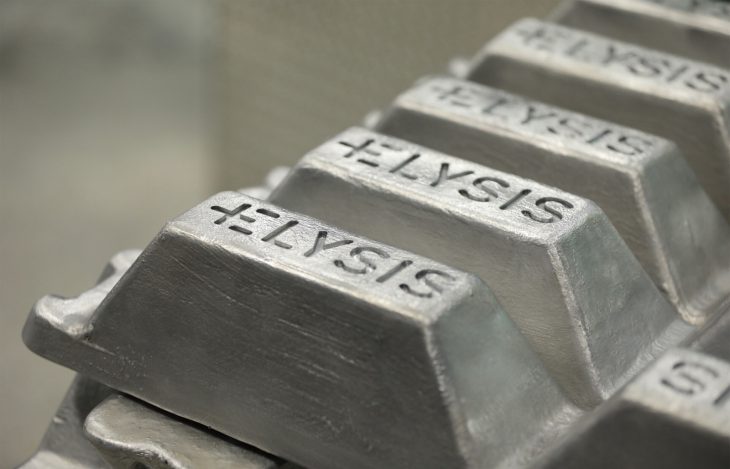Elysis, the joint venture between Rio Tinto and Alcoa, has successfully produced aluminum without any direct greenhouse emissions using its proprietary inert anode technology at its Industrial Research and Development Center in Saguenay, Quebec, Canada. According to the company, this marks a significant milestone in moving toward a full industrial cell design at a size comparable to small smelting cells currently operating in the industry.
“Our team has accomplished tremendous work over the past months and years, showing once again the ground-breaking nature of the change we are making to the industry,” said Vincent Christ, CEO of Elysis. “Results achieved at our Industrial R&D Center demonstrate that we are making serious and sustained progress towards the large-scale commercialization of our technology.”
The Elysis inert anode technology builds on a process first developed at the Alcoa Technical Center outside of Pittsburgh, PA. The carbon-free smelting technology, which emits oxygen, also incorporates the latest in next-generation smelting cell design from Rio Tinto. The combination of these two innovations has led Elysis to develop an industrial breakthrough technology enabling sustainability and performance.
Focused on accelerating the scale-up of the this technology, Elysis started building its first commercial-scale prototype cells using inert anode technology in summer 2021. Construction of these prototype cells, located at at the end of an existing potline in Rio Tinto’s Alma smelter in Saguenay-Lac-Saint-Jean, Quebec, is now well underway.
The industrial smelting cells will operate on an electrical current of 450 kA, which is the commercial scale for many large, modern aluminum smelters. They are designed to be used as a ‘drop-in’ replacement in order to retrofit existing smelters or build new ones. They can be scalable to size as needed.
Under its current development pathways, the company is working to complete its demonstration project in 2023, with the technology available for installation beginning in 2024. At that point, Elysis plans to work on the development and production of even larger carbon-free aluminum cells two years later.
“This is a significant step in reinventing the aluminum smelting process which is well over 100 years old,” said Ivan Vella, chief executive, Rio Tinto Aluminium. “It will help address the paradox that aluminum is a material that is critical for the decarbonization of the world, but also currently one that is very carbon intensive to produce. Rio Tinto looks forward to bringing this breakthrough zero carbon technology to the market and supplying our customers with the green aluminum they are expecting.”
Scaling up the Supply Chain
In order to support the commercialization of the inert anode technology, Elysis has initiated a detailed plan to scale-up the supply chain. In 2022, the company will be begin the design and engineering of a facility that will be able produce the breakthrough, proprietary materials fundamental to making the inert anode, zero-carbon smelting process possible.

